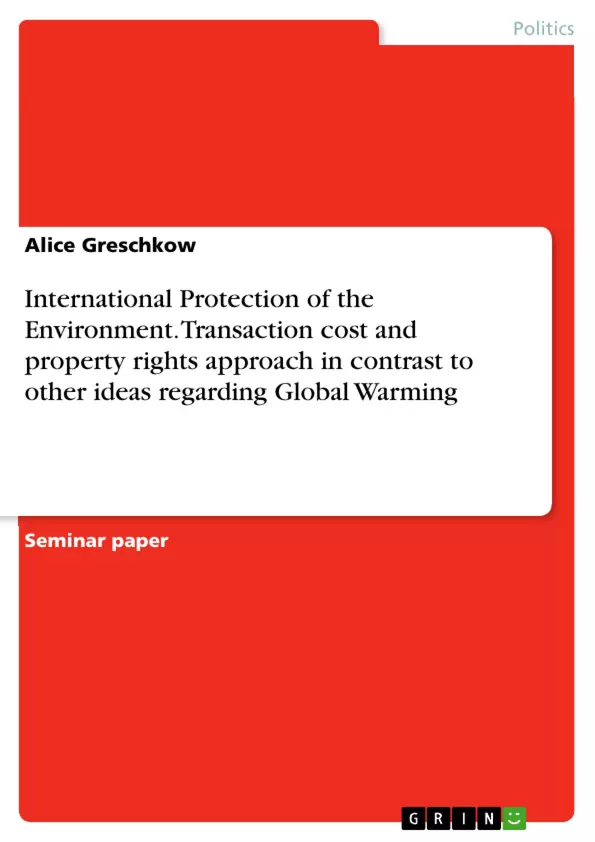Global warming and the protection of the environment have been a rising topic on the political agenda for more more than two decades. However, the progress necessary to avoid an environmental catastrophy hasn't been made yet - often due to high transaction costs for private corporations. This piece elaborates the costs of environmental protection as an explanation for the lack of environmental protection in an international context.
Inhaltsverzeichnis (Table of Contents)
- Introduction
- No name of the game - disagreement about the results of global warming and responsible actors
- Perspectives on environmental challenges Transaction cost and property rights approach meets other mind sets
- Absent rules of the game: Global passivity towards environmental challenges? An explanation using transaction cost and property rights approach
- Other approaches supporting the explanation given by New Institutional Economics
- Conclusion
- Literature
- Books and Articles
- Newspaper articles, online sources and other papers
Zielsetzung und Themenschwerpunkte (Objectives and Key Themes)
This paper examines the reasons for global passivity in preventing climate change, drawing on the transaction cost and property rights approach within New Institutional Economics. It aims to understand why global warming appears unattractive from this perspective and explore potential solutions.
- The impact of global warming on biodiversity and human life.
- The role of human consumption and production in contributing to carbon dioxide emissions.
- The challenges of addressing climate change through international cooperation.
- The application of the transaction cost and property rights approach to environmental policy.
- The exploration of alternative perspectives and approaches to environmental challenges.
Zusammenfassung der Kapitel (Chapter Summaries)
- Introduction: The paper introduces the debate surrounding global warming and its growing urgency, citing the work of ecologists like George Woodwell and the importance of public awareness. The paper highlights the increasing carbon dioxide emissions despite decades of ecological criticism and explores various perspectives on the issue.
- No name of the game - disagreement about the results of global warming and responsible actors: This chapter provides a brief overview of the expected consequences of global warming, including rising temperatures, melting glaciers, and their impact on biodiversity and human life. It discusses challenges related to water availability, ocean ecosystems, and agricultural production. The chapter concludes by outlining the need for global action to address the issue.
- Perspectives on environmental challenges – Transaction cost and property rights approach meets other mind sets: This section delves into the transaction cost and property rights approach within New Institutional Economics, exploring its applicability to environmental challenges. It examines the reasons for global passivity towards climate change, considering factors like the abstract nature of the threat, uncertainties in predictions, and the lack of incentives to act.
Schlüsselwörter (Keywords)
This paper focuses on the intersection of environmental policy, economic theory, and global challenges. It analyzes the transaction cost and property rights approach within New Institutional Economics to understand the complexities of addressing global warming. Key themes include climate change, carbon dioxide emissions, environmental challenges, international cooperation, and economic incentives.
Frequently Asked Questions
Why is global passivity towards climate change a focus of this paper?
The paper uses New Institutional Economics to explain why, despite scientific warnings, international cooperation remains slow due to high transaction costs and undefined property rights.
How do transaction costs affect environmental protection?
High transaction costs for private corporations and governments make implementing environmental standards economically unattractive in the short term.
What is the role of property rights in global warming?
The lack of clearly defined property rights for global commons (like the atmosphere) leads to "free-rider" problems where actors benefit without paying for the environmental damage.
What are the expected consequences of global warming discussed?
Consequences include rising temperatures, melting glaciers, loss of biodiversity, and significant impacts on agricultural production and water availability.
What theoretical framework does the paper apply?
The paper applies the Transaction Cost and Property Rights approach within the field of New Institutional Economics.
- Quote paper
- Alice Greschkow (Author), 2013, International Protection of the Environment. Transaction cost and property rights approach in contrast to other ideas regarding Global Warming, Munich, GRIN Verlag, https://www.grin.com/document/372521



